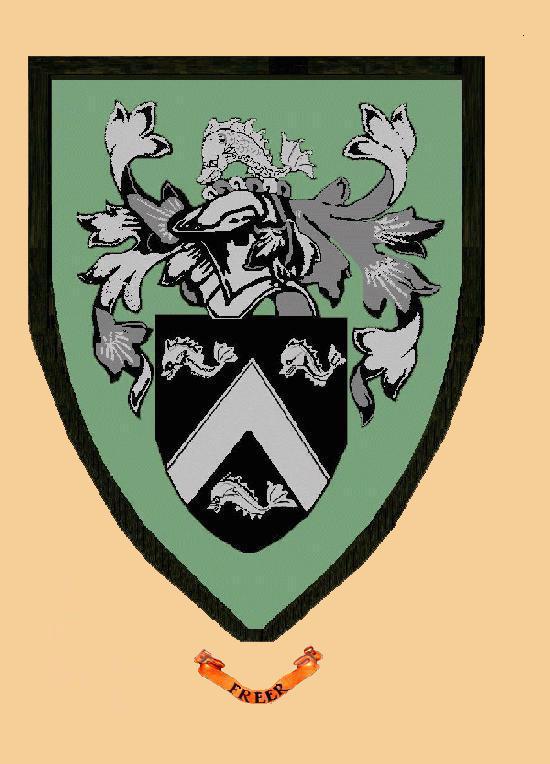

The following information was obtained on Colonel Freear's military records. Dates of his enlistment are support by a W25 record from KEW.
Information below is from correspondence with David Milner.
Mr. Milner has complied a list of Battle of Waterloo participants at his web site.
Arthur William FREEAR fought at the Battle of Waterloo as a Lieutenant in Captain James Skerrow's Company, 2nd Battalion, 30th (Cambridgeshire) Regiment . He was in receipt of the Waterloo Medal that was issued to all the solders who took part in the Battle and 1 would imagine that that is the medal dated June 18th 1815 that you refer to in your letter. I have no mention of his first commission but my records do show that he was promoted Lieutenant on 24 June 1811 and left the service on half pay as a Lieutenant on 20 Nov 1817. According to the Army List of 1828, which is the earliest that I have, he was still on half pay as a Lieutenant in 1825. I have mention of four officers with the surname spelt FREER who fought in the Peninsular War but there is nothing that leads me to believe that Arthur William was one of them. Neither does his name appear in the Military General Service Medal roll of the 30th Foot, but as the medal wasn't issued until 1847 and by that time Arthur appears to have been in Canada, its possible that he either knew nothing about it or didn't bother to claim one. (Note: the Colonel had died in 1844 according to his will/ S. Freer)
Information below is from correspondence from the Secretary,Lieutenant Colonel E J Downham, Regimental Headquarters, The Queen's Lancashire Regiment, Fulwood Barracks, Preston, PR2 8AA, Lancashire, England.
First of all, the outline of his military career: Commissioned 6th June 1809 as an Ensign in 2nd Battalion 30th Regiment of Foot (2nd/30th), which was then in Gibraltar. We do not know when he joined the Battalion for duty, but in April 1810 he was with a detachment of five companies of the 30th, 15 officers and 300 men, sent to drive off a French force, which was threatening Tarifa. The French withdrew. In June the Battalion was sent to garrison the city of Cadiz, which was besieged, where they remained until September.
The 30th was then sent for by Sir Arthur Wellesley, later Duke of Wellington, landing at Lisbon on October 6th, 1810 and marching to join Leith's Division at Sobral, where Ensign Freer is again listed as present. This was part of the famous Lines of Torres Vedres. Freer was also with the Battalion when it advanced in pursuit of the French, in March 1811, to Aldea do Obispo on the Portuguese Frontier, and was presumably present at the action at Sabugal (2nd April), but was apparently not present at the battle of Fuentes d'Onoro (4th May). Nor is he listed at present with the 30th at the storming of Badojoz, 6/7th April 1812, or the battle of Salamanca, 22nd July 1812, and I have no information as to wher" he was at that time. Freer was, however, in action with the 30th at Villa Muriel in Spain, 25th October 1812, when the Battalion advanced in line against seventeen pieces of cannon, cleared the adjoining village, and took more prisoners than their own force was composed of. Freer was now of course a Lieutenant, having been promoted on 24 June 1811. Freer remained in the Peninsula until 18 June 1813, when the 30th sailed home, landing at Cowes, Isle of Weight.
In September 1813, the 30th moved to St. Aubin's, Jersey, where they remained until, in February 1814, they sailed with an expedition to Holland. Our records show that, on 23 February Lieutenant Freer joined the Battalion in a transport from Harwich. The 30th were then engaged in the siege of Antwerp until Napoleon's first abdication, when they remained in garrison in the Netherlands, mostly in Antwerp, Tournai and Brussels.In September 1813, the 30th moved to St. Aubin's, Jersey, where they remained until, in February 1814, they sailed with an expedition to Holland. Our records show that, on 23 February Lieutenant Freer joined the Battalion in a transport from Harwich. The 30th were then engaged in the siege of Antwerp until Napoleon's first abdication, when they remained in garrison in the Netherlands, mostly in Antwerp, Tournai and Brussels.
The 30th were therefore at hand when Napoleon escaped from Elba, and took part in the battles of Quatre Bras and Waterloo, in both of which they particularly distinguished themselves. Freer was in No. 7 Company, commanded by Captain James Finncane. We have a very detailed account uf these battles by a regimental officer. The 30th was then part of the army which occupied Paris, where Freer was present on October 24th.
In December 1815 the 30th embarked for Dover, from where they sailed for Cork to be quartered in Limerick. It was there that they celebrated the first anniversary of Waterloo in fine style, and by all accounts had a very social time. No doubt it was at this time he met Alicia Butler.
The army was now reduced in size and the 2nd/30th was disbanded in April 1817, those who wished to serve on being transferred to the lst/30th in India. Freer was one of those selected for retention, but before the detachment sailed Lieutenant Freer exchanged to half-pay, on 20th November 1817, with Lieutenant Edward Macready... (The Colonel retired due to Rheumatism according to his military record/ S Freer)
